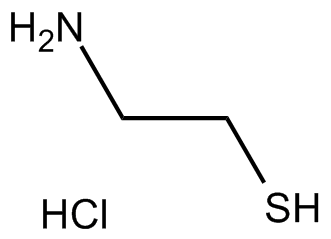Cysteamine HCl (Synonyms: CI-9148, β-Mercaptoethylamine) |
| Katalog-Nr.GC13502 |
Cysteamin-HCl (2-Aminoethanthiol-Hydrochlorid) ist ein oral aktiver Wirkstoff zur Behandlung von nephropathischer Cystinose und ein Antioxidans.
Products are for research use only. Not for human use. We do not sell to patients.

Cas No.: 156-57-0
Sample solution is provided at 25 µL, 10mM.
Cysteamine hydrochloride (β-Mercaptoethylamine Hydrochloride) is an orally active agent for the treatment of nephropathic cystinosis and an antioxidant.
Cysteamine hydrochloride (β-Mercaptoethylamine Hydrochloride) has been shown to increase intracellular glutathione levels in cystinotic cells, thus restoring the altered redox state of the cells. Also increased rates of apoptosis in cystinotic cells, which are thought to be the result of increased caspase 3 and protein kinase Cε activity, is counteracted by Cysteamine hydrochloride administration. Cysteamine hydrochloride has antioxidant properties as a result of increasing glutathione production. Cysteamine hydrochloride is an excellent scavenger of OH and HOCl; it also reacts with H2O2. Cysteamine hydrochloride increases the production of several heat shock proteins (HSP), including the murine Hsp40. Cysteamine hydrochloride exerts a dose-dependent effect on the doxorubicin-induced death of cancer cells, measured in both HeLa cells and B16 cells, whereas Cysteamine hydrochloride treatment alone had no influence on cell survival. In addition, in a doxorubicin-resistant breast cancer cell line, the addition of Cysteamine hydrochloride to doxorubicin results in a dramatic increase in cell death[1]. Cysteamine hydrochloride (100 μM) significantly is able to increase the intracellular GSH levels and the percentage of embryos that developed to the blastocyst stage of culture matured oocytes[2].
References:
[1]. Besouw, M., et al., Cysteamine: an old drug with new potential. Drug Discov Today, 2013. 18(15-16): p. 785-92.
[2]. de Matos, D.G., et al., Effect of cysteamine on glutathione level and developmental capacity of bovine oocyte matured in vitro. Mol Reprod Dev, 1995. 42(4): p. 432-6.
Average Rating: 5 (Based on Reviews and 15 reference(s) in Google Scholar.)
GLPBIO products are for RESEARCH USE ONLY. Please make sure your review or question is research based.
Required fields are marked with *




















